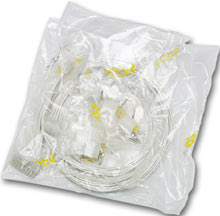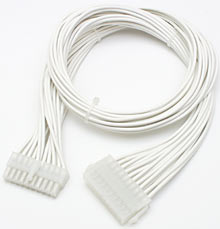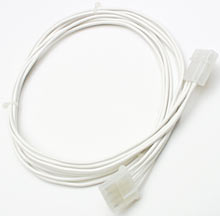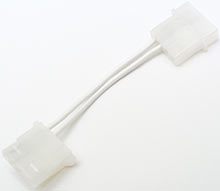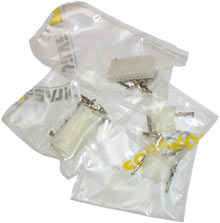
Plugs, sockets and you
Review date: 14 December 2001. Last modified 03-Dec-2011.
12 volt powered gear that's meant to be installed in a computer case - like extra fans, for instance - usually comes with a power connector pre-attached. That power connector is likely to be a normal four-pin receptacle, to suit the plugs that come out of your Power Supply Unit (PSU). Fans, these days, often have a smaller three-wire connector, in which one wire's used for fan speed reporting if you plug the thing into a motherboard that supports that function. If that wire isn't monitored - or isn't even there - then three-pin plugs just work as a simple two-wire 12V connection.
There's tons of other 12 volt gear that overclockers and case modders are likely to want to use in their computers, though. Cheap fans. Really big fans. Lights and displays, and so on. None of this stuff is likely to come with the right connectors pre-wired, or indeed with any connectors at all.
The solution to this problem is, of course, simple enough; just buy the right connector and crimp, solder or otherwise attach it to the power wires, right?
Hold that thought.
There are also people who're using an unusually large PC case, and/or want to tidy their wiring away by cable-tying it to the chassis, and discover that one or more leads from their PSU doesn't reach far enough. They can get themselves a new PSU with longer leads, or splice more wire into the existing leads, or make extension leads with a socket on one end and a plug on the other, or try to find somewhere to buy such a lead. If they're making their own lead, they're going to need plugs and sockets, too.
And then there are people who just need more power plugs than their PSU has. They need to splice wires, too, or else make or buy a one-socket-to-several-plugs octopus-adapter.
So let's say that, for whatever reason, you're trying to buy yourself some quite unremarkable computer power connectors. You're likely to find that most electronics stores aren't able to help you.
Maybe there are lots of great little stores out there that I don't know about, possibly owned by kindly old men who always have just what you want and give you a lollipop as you leave. But there aren't any where I live.
If you go to an electronics store and ask for a car cigarette lighter socket - no problem. You can get one with a little light and a flip-down waterproof door, if you like.
Want an odd-sized plastic-ended barrel plug to suit your digital camera's DC-in jack? A bit more exotic, but doable, at any decent retail electronics place.
Want a standard 20 pin ATX power supply plug and socket, or a four pin in-line drive power receptacle?
Hmm.
In this situation, as an ordinary over-the-counter consumer, you'll probably not have too much trouble getting an electronics store staffer to understand what it is that you want. But they probably won't have any. You're likely to have a dickens of a time finding someone who does, unless you're happy to purchase so many plugs and sockets that they'll be delivered to you by a heavy haulage vehicle.
The only computer DC power connector that's pretty easy to find is the standard four pin "Molex" plug that terminates most of your PSU leads. If you want to ask for them by name and you've been wasting your evenings reading PSU standards documents, you'll know that these plugs are Molex part number 8981-04P. But you won't be able to find anything by that name on the Molex site, or in the catalogue of a Molex distributor, because that's not what they're called any more. Now, the four conductor housings are part number 15-24-4048, and the crimp pins to suit them are part number 02-08-1202.
You can also ask for an AMP 1-480424-0 plug or equivalent, and a pack of four AMP 61314-1 contacts to put in it; that's the same thing made by another company.
The contacts, by the way, are meant to be crimped onto a cable. There's a two-element crimp area that grasps the cable insulation with one little pair of wings and the actual copper with the other pair. If, of course, you've crimped it properly, which can be tricky to do without a proper crimping tool.
But wait, gentle reader. The plugs aren't all you need, if you're making a drive-plug multi-adapter or extension lead. You also need an in-line socket for the other end of the lead.
And those things are about as common as rocking-horse poop.
Molex has in-line socket housings as part number 15-24-4047 (one lower than the plug); and the pins to use with it are 02-08-1216, if you want a bag of them, or some other number if you want a reel.
If your local stockist doesn't have the Molex flavour, though, you may be in trouble.
I invested a couple of hours searching various electronics manufacturing and supply sites, including the Tyco Electronics one (AMP is a Tyco Electronics brand), and I found what looks like exactly the socket you need. It's right there on the left hand side of this picture on the Tyco site.
But you try finding the pigging thing in the actual Tyco catalogue.
The plugs are easy. The sockets don't exist.
You'd think there'd just be a "find what, if anything, plugs into this thing" button that you could click once you were looking at the plugs, but there isn't. Tyco's FAQ gives you a click-heavy workaround, and suggests you e-mail them if you'd like the more obvious function added.
Moving on, RS Components are the Harrods of the high tech world. If you've got an empty building with water and three-phase power, you can turn it into a computer factory with nothing but stuff from the RS catalogue. For a price.
Probably a rather high price.
RS have a branch in Australia, and they stock four-pin plugs and sockets (stock number 471-446 and 471-424, respectively). But they're RS, so they won't sell you fewer than five of either, and they want more than $AU2.50 per unit, ex shipping.
August 2007 UPDATE: A reader from California says Tyco/AMP do now have female "Molex" connectors. They're sold as part of the "Mate-N-Lok" series, for some reason, and the housing part number is 1-480426-0. The pins that go inside the housing are part number 60618-1. Both are available from Mouser Electronics, for 36 and 11 US cents each, respectively.
Jaycar here in Australia have Insulation Displacement Connector (IDC) clamp-together four-pin plugs for $AU2.25 each; they're catalogue number PS-0740. No sockets, though. Altronics have cheap plugs, part number P 5672, for only 63 Australian cents each, plus another 40 cents for pins (P 5675) to suit. But they've got no in-line sockets, only PCB mount ones such as are used on drives. Dick Smith Electronics have an in-line four pin plug, socket and crimp pin set all in one bag, catalogue number P5120, for a rather reasonable $AU3.82. You've still got to do your own crimping, though.
Aussies in search of PC power connectors and cables can, thankfully, do better.
Local overclocking suppliers Silverprop now stock some made-up cables, as well as bare plugs and sockets. And their prices are pretty reasonable, even though everything they sell comes individually packed in zooty-looking heat-sealed bags...
...which photograph rather badly, I'm afraid.
Silverprop stuff
One ATX power connector extension lead. 80 centimetres long (31.5 inches), 20 pin receptacle on one end, 20 pin plug on the other, tastefully presented in white, white and white. At $AU30, this isn't a bargain-priced item, but it's decently long, well assembled and looks nice. If you're scared of soldering and crimping, 30 bucks is a small price to pay to avoid 40 pins worth of it.
If you only need 150mm of ATX lead extension, by the way, Jaycar now have a black-wired lead that'll do the job; it's catalogue number PL0752, and costs $AU8.60.
Back in the land of white Silverprop cables, here's a metre-long (39.4 inch) four pin power extension cable, just as nicely made as the ATX lead. But only $AU7. If you value your time at all, this is a bargain.
One little adapter that looks as if it's been miswired, but hasn't. This is a "12V-5V Fan Cable"; it lets you plug something that's expecting 12 volts into five volts instead, without doing any rewiring work. As long as your 12 volt widget uses the earth wire next to the 12 volt pin on the four pin connector, this thing will work.
The purpose of this adapter, according to Silverprop, is to "reduce fan speed and noise", which it certainly will. It'll reduce both of them to zero, actually, if you've got a fan that won't kick over from five volts. Many fans need six to seven volts to start turning; they'll usually turn from five if you start them with a flick of your finger, but that's not very practical.
The fact that 5V ain't enough is what's led many people seeking to silence their PCs to wire their fan's positive wire to +12V and the negative wire to +5V, giving a seven volt differential that'll run pretty much any fan. Seven volts gives you only around 35% of the air moving power of 12 volts, unless the fan's motor efficiency changes dramatically at the lower voltage, but that's still enough for many applications. And fans at seven volts are all pretty much completely inaudible.
If you've got a fan that will turn from five volts, the Silverprop adapter will cause it to run at less than 20% power, and you ought to be able to hear a pin drop. It's not like it costs a fortune to find out - the adapter's only $AU4.
Finally, a bunch of connectors, with pins to suit, which I've left in their bags in order to prevent the pins from immediately leaping under my furniture. There's a male and a female 20 pin ATX power connector, for $AU11 and $AU10 respectively; there's also a male and a female four pin connector, priced at two Aussie bucks each.
All of these items are listed in Silverprop's on-line shop.
Alternatives
If you just want a power Y adapter, or a quick passthrough power connector for your new 12 volt widget so you won't use up a precious power plug to run it, and you can solder, it's pretty easy to do the job without having to buy and assemble separate plugs and sockets.
Already-wired plugs aren't hard to find, if you can lay your hands on a deceased PSU. Take your dead ATX PSU, or no-longer-needed ancient AT PSU, and hack the wiring loom off. Presto, a tree of plugs. Now you need a socket.
And you can find one pre-wired, thanks to the plethora of CPU coolers with monstrously powerful fans that use three pin motherboard connector power leads. The three pin motherboard connectors are fine if you've got a motherboard that actually has them - if it's a recent board, it probably has - and if it can deliver the several watts that high-powered fans want - which is a lot more doubtful.
To avoid nasty smoking-voltage-regulator surprises, you can connect high power fans to an ordinary PSU power plug. And to do that without any cutting or soldering, you just buy yourself a four-to-three pin adapter. That's a four-pin passthrough cable (four-pin plug on one end, four-pin socket on the other), with a couple of little wires terminating in a three-pin connector coming out of one of the four-pin connectors.
These adapters already come with many CPU coolers, and selling separately for a princely $US2 or so from places like Plycon. Aus PC Market will sell one to Aussies for $AU3.30 delivered, as I write this. Their catalogue number for it is CS-RC5049UPG.
With a four-to-three adapter in hand and rudimentary soldering gear, you've got a simple way to connect any 12 volt item to your PSU, or indeed to run it at seven or five volts, if you do a little more splicing. It'll probably take you considerably less time than crimping fresh connectors onto wire would.
And, importantly, you will at no point have to wallow through giant industrial component databases.
That's good.
Trust me.
Plugs, sockets and cables kindly provided by Silverprop.
